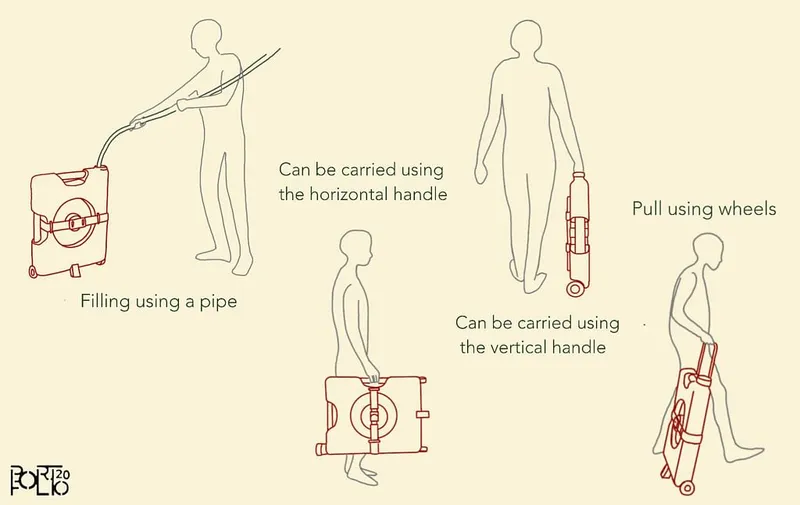With Jal Saathi, this Delhi youngster is helping slum dwellers transport, store water
What started as a college project, Harleen Kaur’s Jal Saathi is a low-cost, hygienic, portable water container—designed specifically to solve the problem of transporting water in India’s slums.
Every morning, a crowd of people gathered around water tankers is a visual familiar in most parts of India. Buckets and pots—of various shapes, sizes, and colours—line the roads as families hurdle to get their share of water for that day’s chores and other activities, including drinking.
Water scarcity is a reality that has grappled several developing countries. India, with 18% of the world's population, has only 4% of its water resources, making it among the most water-stressed in the world. Not surprisingly, a large number of Indians face high to extreme water stress.
A student of design at Pearl Academy, Delhi, Harleen Kaur was clear that she wanted to pursue her profession in the field of social responsibility. She had occasionally seen her domestic help take large empty protein powder boxes to her home.
Upon enquiring, she learned that the boxes are for collecting water. And when it came to her final year project, she didn't had to think twice.

A sample picture of Jal Saathi
In 2020, Harleen started Jal Saathi—a low-cost, hygienic, portable water container—designed specifically for urban slum dwellers in India.
“Most urban shanties do not have access to clean tap water in their homes and seek out external resources such as government water tankers that come for a limited duration each day and lead to long queues. Often, young children, mothers, and the elderlies have to carry the assortment of water-laden containers to meet their family's water requirement,” 25-year-old Harleen says.
Getting started
Intrigued, Harleen decided to visit nearly 12 slums in and around Delhi. Here, she would speak to the locals, take pictures, document, and collect and carry water by herself to better understand the gravity of the situation.
“It made me realise how we take water for granted. We are so privileged to have pipes in our homes that we often ignore the problems people face in other parts of the city,” she points out.
But, not everyone in these areas was willing to speak about the problems they face every single day.
“There was a range of problems that the people in slums were facing. I mainly targeted the transportation, access, and storage problems,” she tells SocialStory.
After a lot of deliberation, mentoring, and designing, Harleen came up with Jal Saathi to help slum dwellers tackle the daily water collection and storage problems.

Using Jal Saathi
The product
Jal Saathi has a compact form, designed to ease transportation through narrow slum alleys, and additional storage space helps with the portability of other items required in the process.
The product is incorporated with large industrial wheels and simple pull-out handles to carry it around easily. It can be carried vertically or horizontally, depending on the height of the user and via an ergonomic grip.
Jal Saathi containers come in two sizes of 15 and 25 litres. Harleen says the 15-litre one is specially made for children who actively participate in transporting water.
Although launched in 2020, Jal Saathi’s manufacturing halted due to the COVID-19 pandemic. And all Harleen could do was test her prototype in the slums, and she was happy to receive good feedback from the people.
At present, she is in talks to tie up with a government policy or an NGO. She aims to sell the product for Rs 450 per unit since it is a one-time purchase.
Since these containers are made out of PVC, making a few moulds for its manufacturing becomes expensive. Thus, Harleen wants to outsource its manufacturing for mass production.

Product in scenario
Recently, the project was displayed at the Delhi Portfolio 2022, Pearl Academy, which showcases a diverse range of innovative projects in the fields of design, fashion, creative practices, media, and business.
Further, it was selected for a virtual presentation as one of the 100 shortlisted graduates at the Global Grad Show-Social Impact Innovations, 2020, which consisted of 1,600 applications from across 60 countries. Jal Saathi was also shortlisted for Global Design Graduate Show, 2020.
A User Experience Designer with Accenture, Harleen is looking for sponsorships to fund her project’s manufacturing processes.
While her mentors at Pearl Academy helped her design the prototype, Harleen has largely bootstrapped her project with her savings.
She says, “I may not be able to fix the lack of water for them [the people in slums], but I can help them at least ease the problem of filling water.”
Edited by Suman Singh








